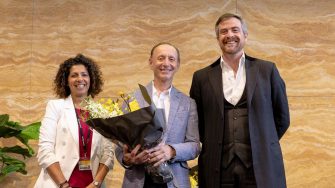From Chemical Curiosity to Enduring Legacy
Meet Camillo Taraborrelli
Meet Camillo Taraborrelli

Camillo Taraborrelli is the manager of the research laboratories in the Science & Engineering building at the University of New South Wales (UNSW), where he specifically supports the Food & Health research group within the School of Chemical Engineering.
With an incredible tenure of 46 years at UNSW, Camillo has made significant contributions to the university. His dedication has been recognised with several prestigious awards, including the Student Experience Award in 2008 and the Long Service Award in 2022. In 2023, he was also a nominee for both the Vice Chancellor’s Value in Action and the Student Choice Awards.
We have the pleasure of interviewing Camillo to learn more about his extensive career and achievements.
Beginning my journey as a Laboratory Assistant in 1978, my initial duties revolved around catering to the fundamental requirements of students. However, with the passage of time, my responsibilities expanded to encompass technical expertise, safety protocols, and procurement. This evolution in my role brought about a deeper sense of satisfaction and fulfillment in my interactions with students and staff, ultimately leading to my advancement to Laboratory Management.
My drive is fuelled by the desire to fulfill the requirements of the students under my care and the staff I collaborate with, spanning both academic and professional spheres. This includes engaging with colleagues from various departments/schools. The presence of a dedicated and supportive professional team in our school provides significant motivation to persist and achieve the objectives that brought me to UNSW.
The hallmark of Chemical Engineering that sets it apart from other disciplines is the wide array of research activities carried out by various groups within our school. Each contributes significantly to enhancing sustainability in critical societal sectors such as food, environmental protection, and healthcare.”
Initially, the essence of Chemical Engineering education lies in imparting knowledge through lectures to students who are keen to join this vibrant community, complemented by practical research projects tailored for them to amass experience and apply this learning in their professional lives. Furthermore, the recruitment of research-oriented academics enriches the depth and breadth of expertise in their fields. Lastly, the infusion of industry funding into our school is pivotal for perpetuating research endeavours within the various groups.
Long-standing tenure is characterised by both official and informal engagements with fellow staff members, and to a lesser degree, interactions with students.
Being part of the UNSW community, which fosters a supportive atmosphere for staff and students alike, is gratifying. Witnessing the transformation of the campus into a self-contained urban hub, where antiquated structures give way to modern amenities and verdant areas, is truly heartening.
Over the years, it has also been marked by sombre moments due to the loss of esteemed colleagues in academia and professional roles, all of whom I’ve had the honour of being acquainted with.
Reflecting on my career, I wouldn’t alter any part of my journey throughout those years.